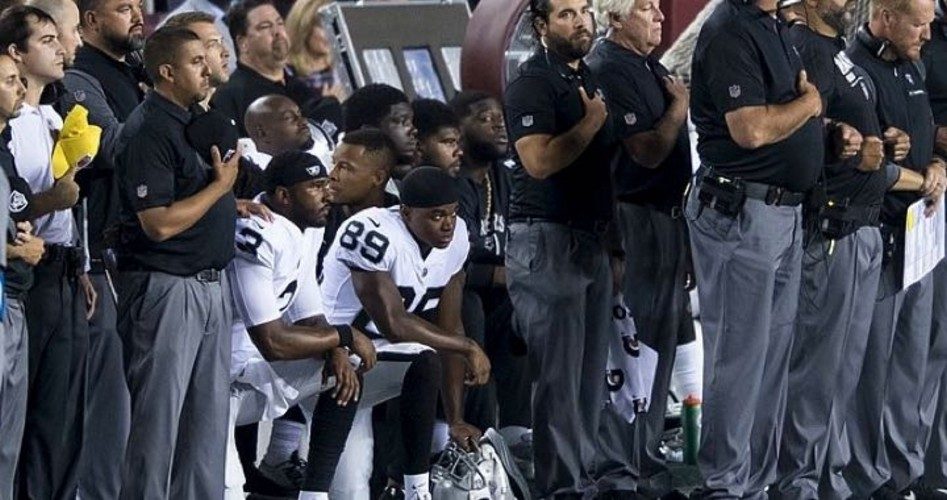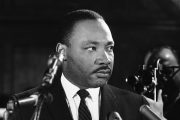
The 2018-2019 football season kicked off this past weekend, and much to the dismay of many fans, so did a new season of National Anthem protests. Unfortunately, there does not appear to be an end in sight to these protests as the NFL is not expected to implement a new policy addressing them.
The protests began in 2016, when NFL players decided to show their opposition to perceived police brutality by taking a knee or sitting out the National Anthem. Despite the swift backlash from fans against what they view as an outward display of disrespect to veterans, police, and the nation as a whole, the NFL responded by awarding the protests’ leader, San Francisco 49ers Colin Kaepernick, the Len Eshmont Award for being “inspirational and courageous.”
The original basis for the protests came as an anti-police and anti-America protest by Colin Kaepernick (who claimed both were racist), who wore socks with police pictured as pigs and lauded the murderous government in Communist Cuba, even though more whites than blacks are killed by police, though, according to the FBI, black Americans are charged with most of the murders in this country, most of the robberies, and nearly half the assaults (while only making up about 13 percent of the population) — and Cuba regularly “disappears” or imprisons or tortures citizens who criticize it. That’s what the protesting players are siding with. Meanwhile black police officers are much more likely to kill both black and Latino suspects than white officers are, and more than 99 percent of those killed by police are armed at the time they are shot.
Fans responded accordingly. By February of this year, the Wall Street Journal reported that just 51 percent of men between ages 18 and 49 said that they followed the NFL closely, down from 75 percent in 2014. According to a February UBS Securities analysis, the decline could be directly attributed to the protests. That survey showed that 50 percent of viewers who admitted to watching less football in 2017 did so because of the National Anthem protests.
“The National Anthem protest was not only the most frequently cited reason, it also had the largest annual increase of any explanation cited for watching less NFL,” said the UBS Evidence Lab in its note to investors.
Thursday’s season opener between the Atlanta Falcons and the Philadelphia Eagles saw a 13-percent decline in viewership from last year.
Yet NFL players appear hell bent on continuing with the controversial protests. Three Philadelphia Eagles players sat out the National Anthem during a preseason game against the New England Patriots, with two more choosing to remain in the tunnel instead of taking the field, for example.
The NFL Miami Dolphins wide receivers Kenny Stills and Albert Watson were the first players to take a knee during the National Anthem this official football season, while Dolphins defensive end Robert Quinn and San Francisco 49ers wide receiver Marquise Goodwin chose instead to raise fists.
And many fans will be disappointed to learn sources have indicated there will be no policy in response to the controversial protests, ESPN reports. Though the NFL passed a new anthem policy in May that would ban players from protesting on the field during the anthem, the league has placed those rules on hold to allow more time for debate between the league and the players union after the NFL Players Association filed a grievance stating the policy was “inconsistent with the collective bargaining agreement and infringes on player rights.”
While Americans recognize freedom of speech as an inalienable right (this is not speech and it’s not in the public venue — companies countrywide fire workers for egregious behavior or behavior that hurts the profitability of those businesses every day), critics also view the NFL’s stance toward the protests as hypocritical, as the league has stood firmly against other more innocuous demonstrations from football players.
For example, the league prohibited a player from wearing patriotic cleats in memory of 9/11 and stopped the Dallas Cowboys from placing an “Arm in Arm” decal on their helmets to honor the five officers killed in Dallas.
Critics also note that the league has become increasingly politicized in recent years, without balance — the politics have been strictly left-wing.
Two years ago, Beyoncé performed during the Super Bowl halftime show in a Black Panther outfit and her backup dancers held up raised fists. Lady Gaga was permitted to perform at last year’s Super Bowl, even as speculations abounded over whether she was going to get political. And though she kept her performance largely apolitical, the NFL had no intention of stopping her if she had not.
In fact, when reports came out stating that the NFL instructed Lady Gaga to avoid politics during the halftime show, the organization went out of its way to dispute the claims. “This is unsourced nonsense from people trying to stir up controversy where there is none,” an NFL spokesman announced.
The NFL even intervened in debate over a transgender bathroom bill in Texas. The league threatened to punish Texas if it forged ahead with a bill prohibiting transgender individuals from using bathrooms based on their “gender identity,” despite the fact that the Texas bill did not affect stadiums or private businesses.
Last December, the league agreed to fund left-wing advocacy groups deemed important to players, including the Dream Corps, a leftist advocacy group connected to globalist billionaire George Soros. The NFL reached an agreement with the Players Coalition — a group created in 2016 in response to perceived institutional bias within law enforcement and consisting of both current and former NFL athletes — to pay $73 million over the next seven years to various groups supported by the coalition. Of that amount, 25 percent has been allocated to the United Negro College Fund, another 25 percent has been earmarked to Dream Corps, and the remaining 50 percent would be controlled by the Players Coalition. Critics of the agreement opine that it has diverted funds away from the league’s other major charitable endeavors such as Breast Cancer Awareness and Salute to Service.




